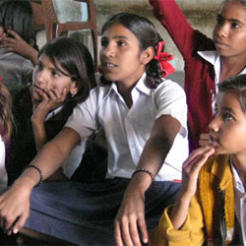A development impact bond worth $238,000 (£140,000) aiming to improve the quality of girls’ education has been launched by the Children’s Investment Fund Foundation and UBS Optimus Foundation.
Development impact bonds are an adaptation of social impact bonds, a type of payment-by-results agreement where investors put money into an organisation to pay for an intervention, and are repaid at a profit by funders if the intervention proves successful.
The UBS Optimus Foundation will invest $238,000 in Educate Girls, an NGO operating in government-run schools in Rajasthan, India, to enrol and retain girls, as well as to improve learning outcomes for all children. The Children’s Investment Fund Foundation (CIFF) will pay for social outcomes achieved by the program.
A spokeswoman said the development impact bond aims to become a ‘proof of concept’ for replication and scale-up in the education sector and beyond.
“This is a world first for international education,” said Michael Anderson, chief executive of CIFF. “Development impact bonds will focus government and the aid industry on costing and paying of results. This model can transform the way development is done: new ways of working, and a clear accountability around outcomes for children. We want to test this model, and we want to show the world it can work.”
Phyllis Costanza, chief executive of the UBS Optimus Foundation, added that it will strive to make it a “financially attractive way for investors to improve the lives of children facing adversity”.
The World Economic Forum’s 2013 Gender Gap Report ranks India 120 out of 136 on gender gap in educational attainment. According to India’s 2011 census, Rajasthan’s literacy of 67 per cent rate it ten points below the national average. At 53 per cent , Rajasthan’s female literacy rate is the lowest in the country.









